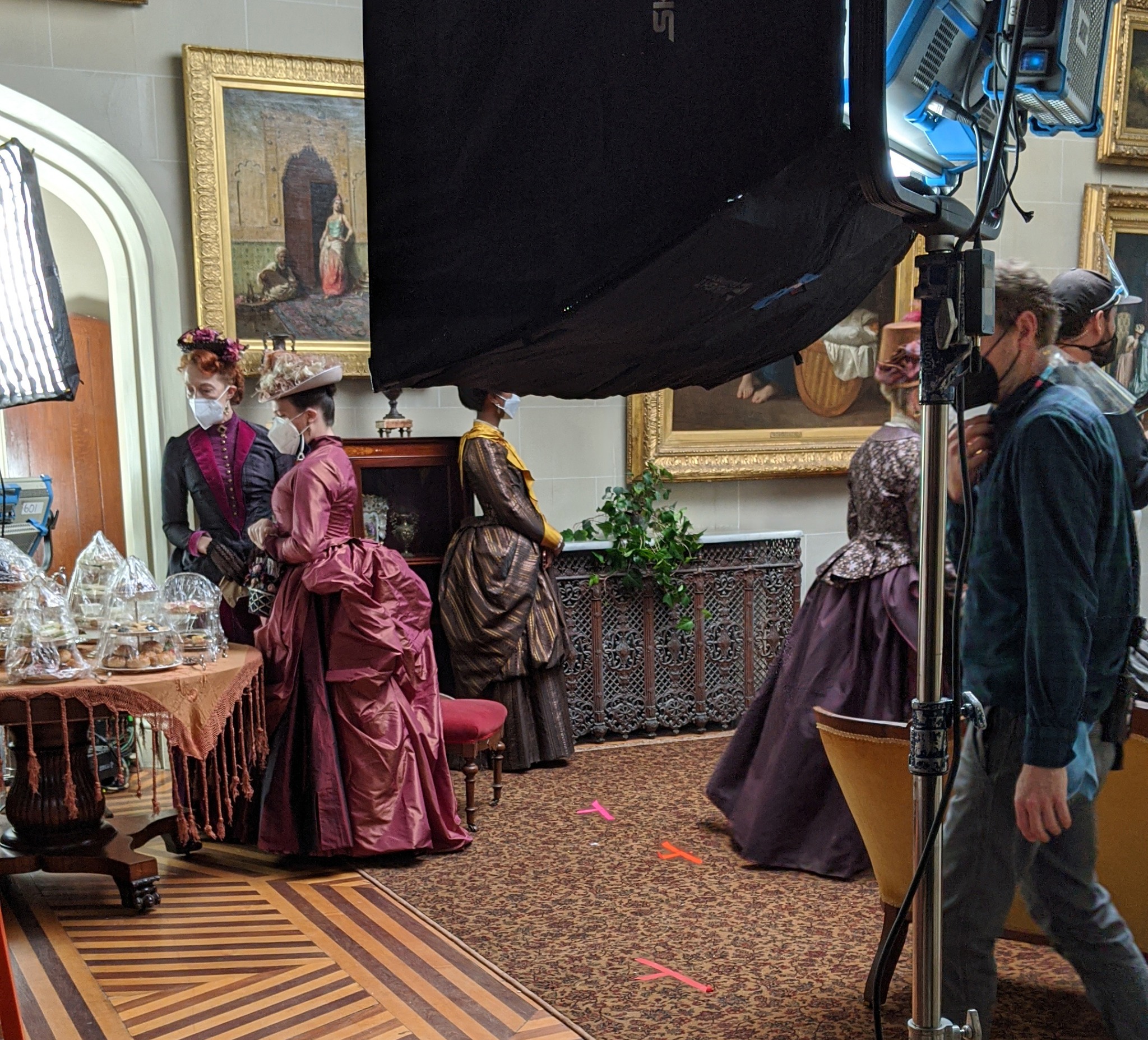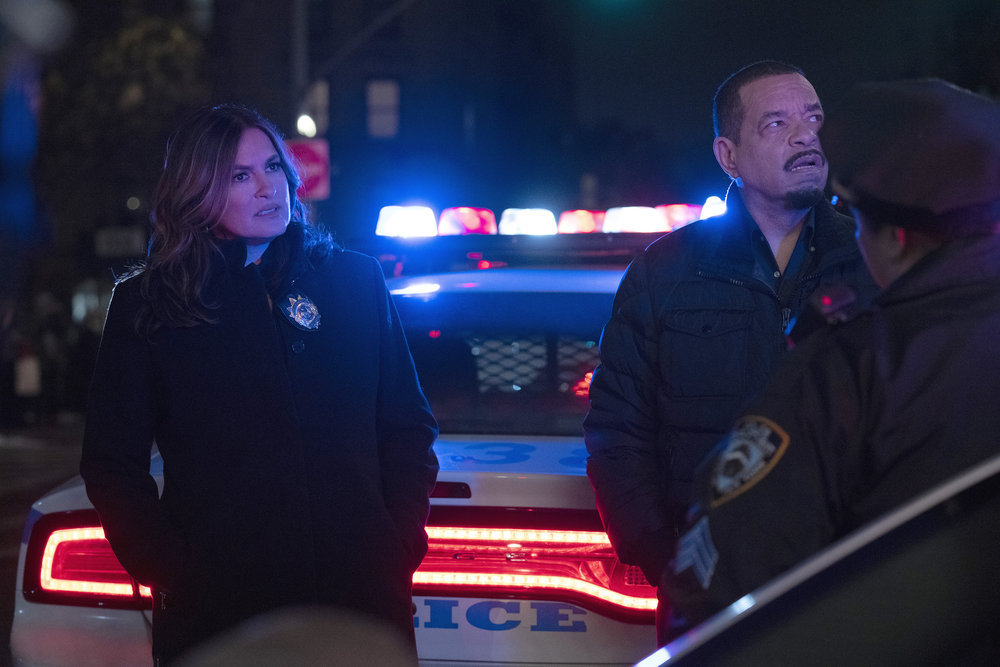Lights, Camera, Action! (In Westchester?)
News Based on facts, either observed and verified directly by the reporter, or reported and verified from knowledgeable sources.
Forget Hollywood and the Big Apple — the new hotspot for TV and film production is right here in our back yard

Good morning! Today is Monday, April 11, and you are reading today’s section of Examiner+, a digital newsmagazine serving Westchester, Putnam, and the surrounding Hudson Valley.
Take Examiner+ on a test drive today at NO CHARGE for a full month. Enjoy full membership-level access to all of our premium local content, delivered straight to your inbox six times a week.
Today’s Examiner+ is sponsored by On the Divide.


If you tune in to The Gilded Age — the new HBO show which follows millionaire titans at the upper echelons of New York society as they battle between the nouveau riche and old money in 1880s New York — from your living room couch in Westchester, you may notice a few familiar locations.
Despite the show’s ornately glamorous costumes and post-Industrial Revolution time period, which differs significantly in look and feel from life in 2022, the same Westchester County that residents know and love served as the backdrop for the historical drama series.
Filming, which took place over several months in late 2020 and early 2021, included scenes shot on location at the Edith Macy Conference Center in Briarcliff Manor, Glenview at Hudson River Museum in Yonkers, Sleepy Hollow Country Club, and inside the mansion and on the grounds at Lyndhurst and Belvedere Estate in Tarrytown.
“Westchester County was a goldmine for us,” David Crockett, executive producer of The Gilded Age, tells Examiner+. “We had access to many historic homes that are period-correct and were owned by families whose stories mirrored the stories in our series. Because they are situated on campus-like settings, we were able to settle in and shoot a number of sets without having to move to a different location each day.”
With a daily production crew of 150 to 300 people, Pace University in Pleasantville was used as both a film location and cast and crew basecamp.
”At Sleepy Hollow Country Club, for example, we filmed three distinct sets in one Vanderbilt Mansion over the course of six days,” Crockett adds. “This was particularly advantageous during COVID since each day of filming requires us to provide 5,000 to 10,000 square feet of support space.”
Crockett says the Edith Macy Center, which was scripted for Lower Manhattan was a big find for the production, as well as the Lynhurst Mansion, which stood in as Mrs. Fane’s house, the New York Globe Offices, and Central Park.
“We had one-stop shopping with plenty of space to park our trucks and provide support for our hair, makeup, and wardrobe teams,” Crockett says.
Location scout Lauri Pitkus, in a statement announcing the series’ premiere, says that scouts were not only looking for historic locations but also larger properties where the production could park its trucks, construct tents for cast and crew operations, and have park-like grounds to serve as a central basecamp for the production.
Westchester, Pitkus explains, offered that flexibility — something that Crockett says makes them excited to come back to Westchester for filming the second season.
Rolling Out the Red Carpet for Hollywood
The Gilded Age joins a growing list of productions shot throughout the county — including hit shows such as Billions, Search Party, Succession, Marvelous Mrs. Maisel, Severance, Pose, and Mr. Robot, as well as long-standing fan favorites like Sesame Street and Law & Order: SVU, which most recently filmed scenes for its April 7 episode in Elmsford.

In the 10 years since Natasha Caputo has served as director of the Westchester County Tourism and Film Office, she has seen filming in the county continue to take off — an indication of what people in the industry say is a direct result of the office’s helping hand. “We have grown to be a resource, and that is by doing the outreach, asking for the business, and welcoming and creating a very production-friendly environment where we can assist,” Caputo says.
At the Tourism and Film Office, Caputo, working alongside her deputy director Barry Surman, provides a one-stop concierge service for all filming that takes place within county limits. Working to support at every step of the project, they help productions with everything from suggesting locations and navigating the permit process to connecting companies with local crews and services and offering guidance for the state film tax credit process. “We permit county-owned property and then facilitate and work with all the municipalities throughout Westchester County,” Caputo says. “The diversity that we have and the services that we provide makes Westchester so attractive for productions.”
Despite The Gilded Age taking place two centuries ago, Caputo says they were able to make the production come to life in Westchester. “I always say that we can be the backdrop of any location because of our small town scenes, rural landscapes, urban settings, and historic mansions,” Caputo continues. “The Gilded Age shows how multiple locations of Westchester County can come together within a show.”
Why Westchester
Ernie Karpeles, a seasoned location scout who has worked in the film industry since the 1980s, says the diversity of locations in Westchester, coupled with its proximity to New York City and the support Caputo and Surman offer, makes the county an ideal place for productions to shoot. “What you get in Westchester is Natasha and Barry, which is a wonderful film commission that will help guide you, a diversity of locations, and you’re really proximate to the city,” Karpeles says.
In comparison to other suburban areas outside the city, like New Jersey or Long Island, Karpeles says Westchester is one of the easiest locations for productions to get to. “You’re not dealing with as many bridges, tunnels, and traffic situations,” Karpeles says. “In my opinion, you can do it all up here in Westchester.”
As a location scout, Karpeles has a library of places from which he and his colleagues work. While Karpeles was not involved with the first season of The Gilded Age, he’s currently working on the second season, scouting in the five boroughs, as well as Westchester and Rockland County. “The script has been broken down, and I get assignments where they show me a bunch of locations that we need,” Karpeles explains.
In television, Karpeles highlights, it’s all about grouping shots and working within a geographically-close radius so you can make the most out of one day of filming. “I look at the scripts, we discuss as a team what we need, and I go out and try to find it,” explains Karpeles.
Because of COVID regulations, which require film crews to spread out, Karpeles says Westchester offers the space somewhere like Manhattan cannot. “North of the city was very desirable for productions because we were able to spread out,” Karpeles says.
Prior to the pandemic, the space Westchester can provide was still a selling point — especially for a large film production like Steven Spielberg’s 2017 film The Post, which Karpeles also worked on. “We take up a lot of space. It’s just the nature of the beast.”
Because of Westchester’s diversity, the county’s varied locations can masquerade as an endless possibility of film locations.
The harbor in New Rochelle, Karpeles explains, looks like coastal Maine. The winding road going down to Bear Mountain Bridge looks like the Rocky Mountains out west. There is bucolic farmland with cows grazing in the Rockefeller State Park Preserve, bustling downtown areas, and a wide variety of suburban towns with homes built in every time period.
“We’re really fortunate in Westchester,” Karpeles says. “I’m always able to find interesting things.”

A Financial Boon
With production companies flocking to Westchester, the film industry is a serious economic driver for the county. “In a very conservative aggregate, the industry generates over $45.7 million dollars of economic impact, and that’s new money that’s coming in through these productions using Westchester as a stage,” Caputo says.
Big cities like Yonkers, White Plains, and New Rochelle see a lot of film activity in particular, but Caputo says Peekskill, Harrison, and Mamaroneck are also consistently popular. Because municipalities realize how much money the film industry can bring in, it’s a motivator for cities, towns, and villages to make themselves more film-friendly to attract business.
“There’s a healthy revenue stream from permit revenue and ancillary benefits when production companies patronize our local businesses, hire local crews, and stay in our hotels,” Westchester County Executive George Latimer says.
When White Plains Mayor Tom Roach first came into office, he said the city did not have a good system in place for filming. At the time, there were complicated rules and no one knew what was being shot at a given time. Since taking office, Mayor Roach created the Mayor’s Film Office, with Jill Iannetta at the helm. From there, they worked to create a streamlined system with a simple permit process.
Additionally, the city created a virtual portfolio where White Plains residents can submit their homes for consideration for a film or television shoot, which also makes it easy for location scouts to browse potential options. One family, Mayor Roach notes, got so lucky to have their house picked and kitchen remodeled for a shoot — with the offer to keep the upgrade.
By simplifying and organizing the process, Mayor Roach says the city has seen a lot of activity, which is now coming back to pre-COVID levels. Billions, Marvelous Mrs. Maisel, City on the Hill, The Time Traveler’s Wife, and The Post have all shot in White Plains in recent years, including scenes in City Hall. “The economic impact is very positive for the city and also our commercial properties, restaurants, stores, and residents,” Mayor Roach says.
At the onset of the pandemic when many restaurants were struggling financially, Mayor Roach says a couple of restaurants that were selected as film locations received a much-needed influx of cash. “It really has been a boost for the economy, but it’s also fun,” Mayor Roach says. “People love it when it’s happening.”

Karpeles, who lives in Larchmont, recently worked with Mayor Lorraine Walsh to create a new film policy, which sets forth certain rules and regulations for filming in the village. Since then, filming has continued to take off in Larchmont. “I [worked on] Ben is Back with Julia Roberts, and it was really nice to shoot at the church down at Fountain Square,” Karpeles says. “For me, that was really gratifying to see that filming can work in Larchmont.”
Mayor Walsh says the wealth of striking locations and diversity of building styles in Larchmont, from Victorian to mid-century modern, combined with the village’s proximity to Manhattan, makes it an attractive location. “We have streamlined our permitting process, our municipal officials and staff are experienced with handling the needs of TV and film production, and our local businesses stand ready to provide catering and supplies,” Mayor Walsh says. The economic impact, she notes, is particularly important. In February, the Village received over $23,000 in two weeks from three productions.
Caputo underscores that the visibility of seeing Westchester on the screen also helps support tourism throughout the county. Whenever a buzzed-about series like The Gilded Age shoots within the county, many articles emerge noting the filming locations, which encourages readers to visit. “Those are new visitors who don’t live here that are generating economic impact,” Caputo says.
Karpeles underscores that film productions bring a significant cash flow wherever they film, not only through permits but also from patronizing local businesses like bagel shops and hardware stores and paying police officers overtime to help oversee a location’s security. “It brings a lot of money in wherever we film, and New York State certainly appreciates that,” Karpeles says.
That’s why states in the tri-state area including New York all have incentive programs to attract filming. In January, Governor Kathy Hochul extended the state’s film and TV tax credits — one of the most competitive incentive programs in the country — by three years to 2029. “The reason it’s worth spending money [to attract filming] is because it comes back in spades,” Karpeles says.
Hollywood on the Hudson
In Yonkers, Mayor Mike Spano hopes to make the city “the Burbank of New York,” referencing the city outside Los Angeles home to many major film studios.
Great Point Studios — which opened the doors to its long-awaited, $500 million Lionsgate Studios Yonkers in January and will soon become the largest film and television production facility in the Northeast — will help Spano get even closer to fulfilling that goal.
Built around the site of an old factory overlooking the Hudson River, the facility currently houses three soundstages, six talent suites, dozens of dressing rooms and hair-and-makeup stations, writers rooms, a carpentry shop for set construction, and office space.
By the end of next year, the 14.5-acre campus plans to complete a backlot for shooting outdoor scenes, two screening rooms, a postproduction area for editing, and a total of 11 soundstages.
“This state-of-the-art media complex will help complete the transformation of the Yonkers waterfront,” Mayor Spano said in a statement announcing its opening. “Local commerce will benefit from the expected 1,000+ people working at the studio complex daily. We look forward to welcoming Great Point Studios, Lionsgate, and all of the new companies to Yonkers.”
WATCH THE VIDEO: A look at Lionsgate Studios Yonkers
Latimer says he’s thrilled to see Lionsgate Studios open in Yonkers. “It cements Westchester’s position as a premier destination for film production,” Latimer says. “We expect to see a wide swath of economic benefits as productions look for additional locations nearby and patronize local businesses for support services.”
Caputo agrees and looks forward to helping service that growth. “Lionsgate is going to not only expand but also further position Westchester as a destination for filming,” Caputo says. “I’m confident that we’ll see further economic benefit to the county.”
Bailey Hosfelt is a full-time reporter at Examiner Media, with a special interest in LGBTQ+ issues and the environment. Originally from Connecticut and raised in West Virginia, the maternal side of their family has roots in Rye. Prior to Examiner, Bailey contributed to City Limits, where they wrote about healthcare and climate change. Bailey graduated from Fordham University with a bachelor’s in journalism and currently resides in Brooklyn with their girlfriend and two cats, Lieutenant Governor and Hilma. When they’re not reporting, Bailey can be found picking up free books off the street, shooting film photography, and scouring neighborhood thrift stores for the next best find. You can follow Bailey on Twitter at @baileyhosfelt.
We hope you’ve enjoyed today’s section of Examiner+. What did you think? We love honest feedback. Tell us: examinerplus@theexaminernews.com
For hyperlocal news coverage of Westchester and Putnam from our four community newspapers, visit our sister site, www.theexaminernews.com

Examiner Media – Keeping you informed with professionally-reported local news, features, and sports coverage.
